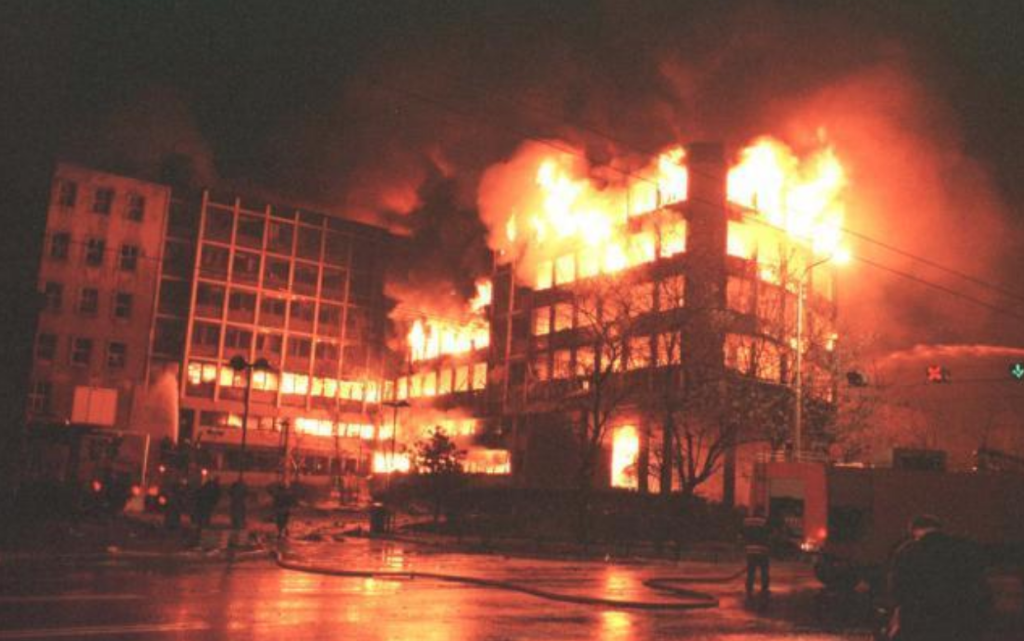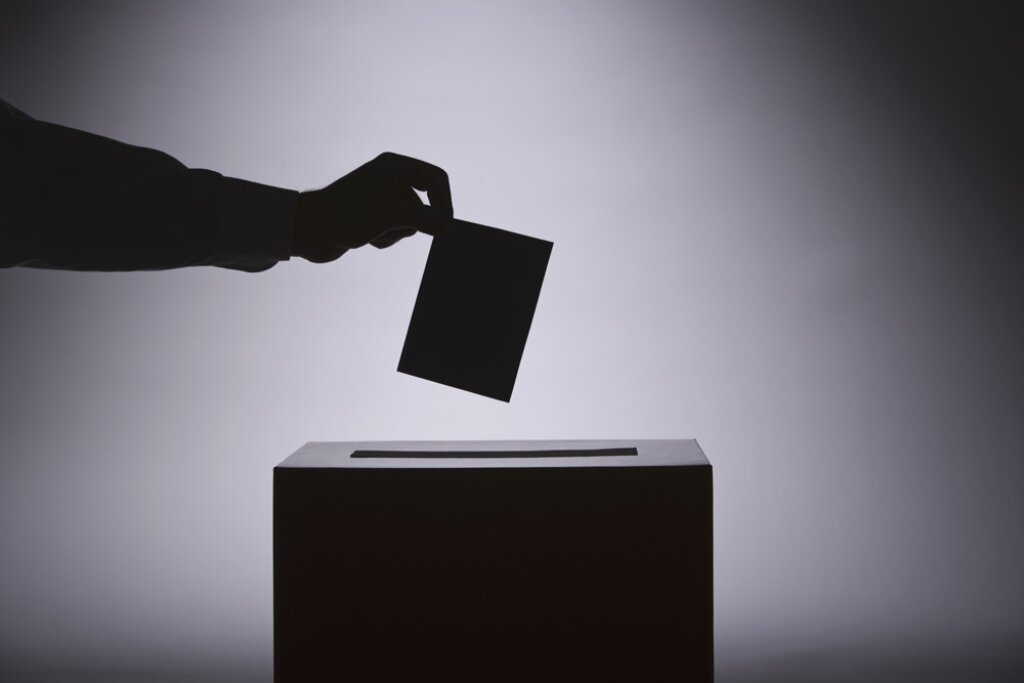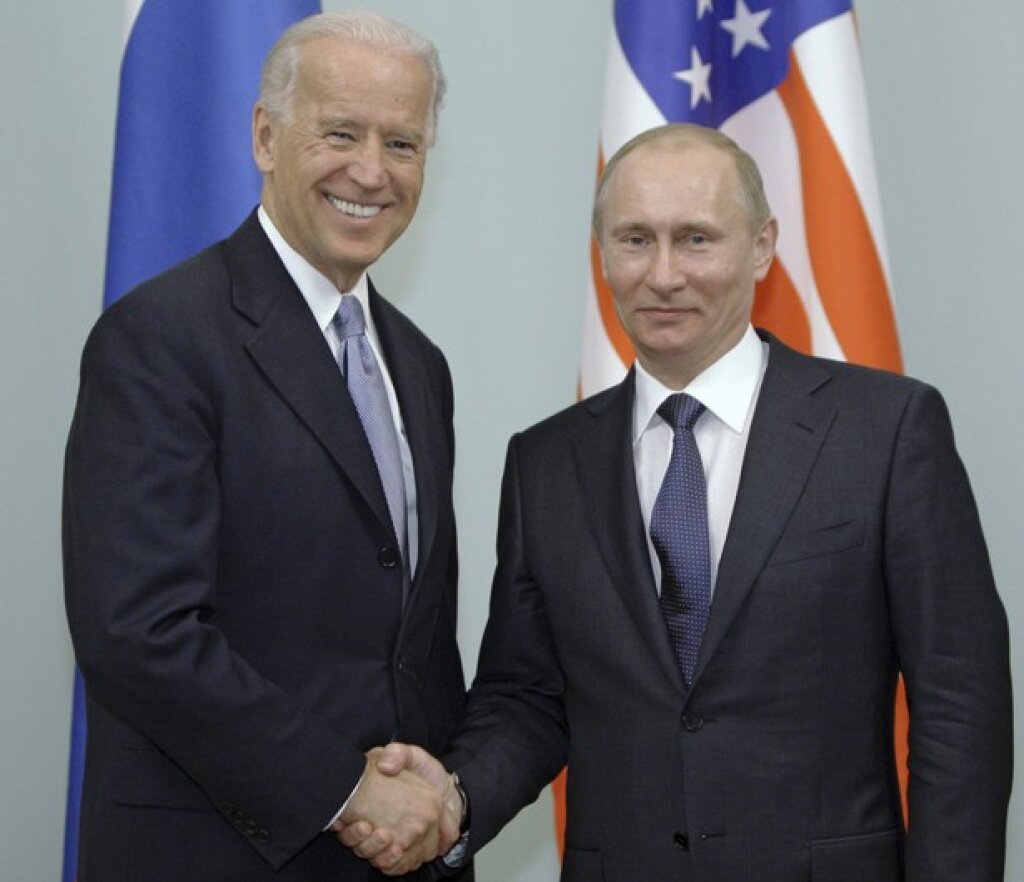The Jordan Center stands with all the people of Ukraine, Russia, and the rest of the world who oppose the Russian invasion of Ukraine. See our statement here.
This post was a Judges' Choice winner in the Jordan Center Blog's third Graduate Student Essay Competition.
Above: A scene from the NATO bombing of Yugoslavia in 1999. Source
A recent immigrant from Serbia through the US State Department's Diversity Visa program, Filip Mitričević is a third-year doctoral student of modern East European History at Indiana University Bloomington, working on historical memory in the Yugoslav space.
Some two decades ago, Serbs had bombs dropped on their heads, just like the Ukrainians right now. Yet some have displayed an obvious lack of sympathy for the current experience of ordinary Ukrainians. The silence of missing compassion is deafening, drowned out only by the voices supporting Putin.
The Serbian and Ukrainian situations are not fully comparable. In 1999, Serbs suffered because of genocidal actions against the independence-seeking Albanian majority in the province of Kosovo by the rogue Serbian regime. Unlike Slobodan Milošević then, the Ukrainian government did nothing to “earn” Putin's aggression. Moreover, the plight of ordinary people victimized by war should theoretically guarantee universal compassion. Why has that not been the case?
The Serbian government’s response to the war in Ukraine was and is flat. A membership candidate to the EU, Serbia failed to align its foreign policy with the EU's despite numerous calls to do so from Brussels. The current Serbian president, Aleksandar Vučić, has remained steadfast in his perfectly vague “head in Europe, heart in Moscow” politics, originally declared back in 2016. A more recent policy position, dating to March of this year, states that “Serbia supports the integrity of Ukraine, but opposes sanctions against Russia."
Yet the most painful echoes within public space inside Serbia and internationally are the pro-Putin rallies in Belgrade; the motorcade through the city center brandishing the infamous “Z” symbol in emulation of Russian tanks; the murals supporting the Russian president; and Red Star Belgrade's basketball players refusing to hold a Ukrainian flag with a “Stop the War” slogan before their game against Lithuanian Žalgiris Kaunas, or waving a Serbian flag emblazoned with a giant “Z” during the most recent Red Star-Partizan soccer derby. Topping it all off was a February 22 report from a Serbian daily falsely stating that Ukraine had attacked Russia.
The greatest tragedy of the missed opportunity to side with the oppressed, in my mind, were people’s comments on the news of the invasion. On the first day of the war, a Serbian news site published a post titled “Putin 1, West 0.” Below, readers left comments like "I will never forgive or be able to side with NATO and the EU for what they did in 1999” or “I’m not for the war, but the Ukrainian politicians accepted NATO. Russia is not going to stand for that.” A user calling themselves “NS boy” declared their love for both the Russians and the Ukrainians, but said that this time, they were "rooting against the US.” Another user, "PlayBoy," wrote, “Russia is conducting a legitimate preventative strike. NATO is arming Ukraine."
It is only natural to ask, where is all this ugliness coming from?
An almost prophetic answer came from one of the commenters on "Putin 1, West 0": “This all started with Kosovo.” The myth of Kosovo has become a synonym for sacrificing for the Serbian nation, metonymically representing a glorious past that will one day, hopefully, return. For Serbs, Kosovo represents a great injustice that can never be forgiven or forgotten, even for the sake of our shared humanity.
Once the heart of the medieval Serbian state and the site of a 1389 battle, Kosovo has long stood for a Christ-like military sacrifice marking the beginning of the Ottoman Empire's northward push into the Balkans. In its self-assigned role as bulwark against a “barbaric” invasion of Europe, Kosovo, for many Serbs, is their ticket into the Kingdom of Heaven. When the province was "lost" in 1999 as a part of the treaty that ended the bombing, Serbs once again threw themselves on the cross.
The Serbian relationship with Kosovo and the location's mythical aura can be subsumed under what Svetlana Boym called "reflective nostalgia" in her 2001 book, The Future of Nostalgia. “Reflective nostalgia,” she wrote, "lingers on ruins, the patina of time and history, in the dreams of another place and another time.”
This trauma-infused patina is proving to be a stumbling block in the Serbian present. When Slovene Euro-parliamentarian Klemen Grošelj declared that “If Serbia prefers Russia, we’ll respect that. But this decision will have implications on its path to the EU,” one commentator declared, “Of course we prefer Russia, you were the ones who bombed us!”
Based on reading comments online, watching TV surveys, or simply speaking to some of my friends, I've concluded that a significant number of people in Serbia see the war in Ukraine as a conflict between Russia and NATO. If those are the positions, Serbia's side is clear—always and ever against those calling themselves or aligning with NATO, whether they are right or not.
While we cannot be sure if blindly following the logic of “the enemy of my enemy is my friend" will cost Serbia its future in the EU, it is currently costing the country its soul. To keep one's soul, an admittedly abstract and unquantifiable notion, would mean siding with the attacked party. Feeling compassion for one's fellow humans, especially when you know exactly what they are going through. Sympathizing and standing up for the obvious victim.
As a nine-year-old kid, I watched the antiaircraft ammunition pierce the night sky in shades of yellow, orange, and red. It was the most fantastic display of fireworks I had ever witnessed. Excited and amazed, unscared nine-year-old me enjoyed the show, almost cheering internally. Watching “our boys give hell to those NATO bastards” was a communal, not only a familial thing. And what the assembled neighborhood found in those yellow, orange, and red blazes was pride—and spite. If anybody was scared, they never showed it.
I never endured the trauma of war. I was shielded by my parents, who tried desperately to protect me from its everyday horrors, and also by the perspective of a nine-year-old living in a village not interesting to NATO. I lucked out—but my nation did not, however much Serbs might have hidden their pain behind spite.
Serbian public discourse surrounding the 1999 bombing is a collective wound that seems never to heal. The event is deeply embedded in people’s consciousness. Some are lashing out right now, reveling in Schadenfreude. But it is not too late to assume a position on the right side of history.



